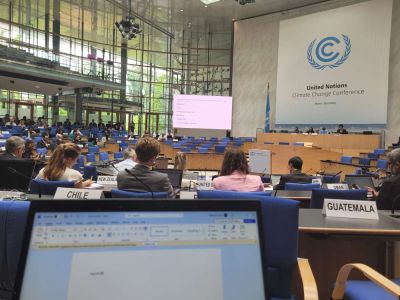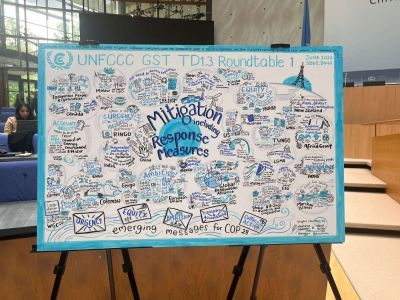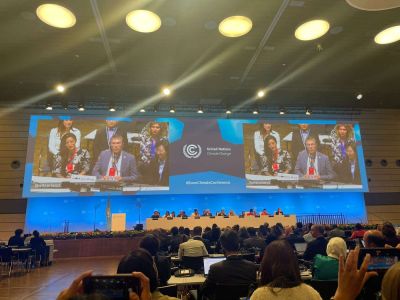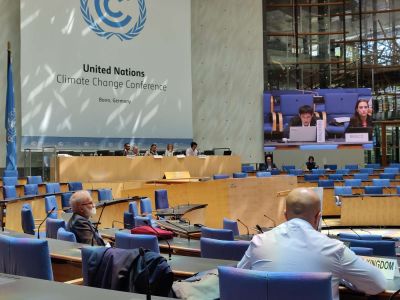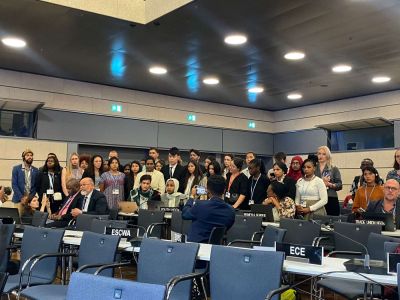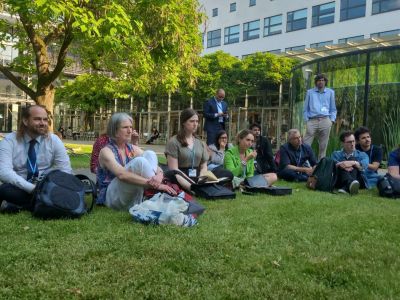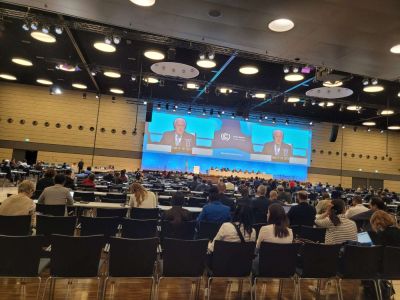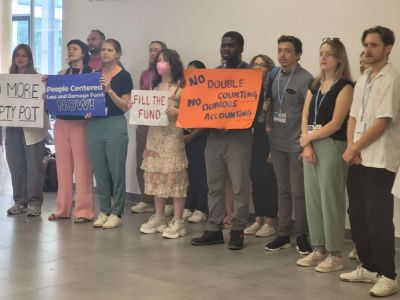
GI-ESCR participated at Bonn Climate Change Conference 2023
The Global Initiative for Economic Social and Cultural Rights participated at the Bonn Climate Change Conference, representing civil society organizations within the Mexican Delegation. In this role, GI-ESCR contributed following up on the negotiations related to the work programme on just transition pathways that was established in decision 1/CMA.4 adopted at CoP27 in Sharm el-Sheikh.
This is a new mandate that will seek to establish the objectives, scope, institutional arrangements, modalities and outcomes of a work programme which will aim to achieve the objectives of the United Nations Framework Convention on Climate Change and the Paris Agreement, putting at the heart of these efforts a broad range of equity and social justice concerns. Despite having different views and approaches to defining a “just transition” and its priorities, delegations moved forwards with the discussion. Several delegations considered that the work program should go beyond the traditional focus on the energy sector workforce and encompass other vital areas, such as agriculture, building, transport, and waste management, emphasising the importance of tackling the transition across all strategic sectors. The debate revolved around the opportunity for the programme to provide best practices and learning experiences to conduct just transition processes at the national level and the role that the UNFCCC multilateral process could play in supporting different stakeholders to accelerate just pathways towards sustainability.
In the upcoming months, an open process to make submissions on the elements guiding the working programme and a workshop to discuss the inputs for this new mandate will be held before the next SB59. GI-ESCR contributed to these efforts to start defining the content of the working programme on just transitions ensuring it is as inclusive as possible and ensuring parties and observers can participate meaningfully. GI-ESCR will be working with partners towards developing a written contribution that can set a human rights blueprint on how the just transition working programme could look like and follow up the negotiations for the upcoming CoP28 in Dubai.
One of the main items advanced during the Bonn Climate Change Conference was the Global Stocktake (GST) negotiations, the first comprehensive assessment of the progress achieved in implementing the Paris Agreement. The parties adopted conclusions with the main structure that the evaluation should encompass, and civil society organizations worked towards ensuring that key messages on the importance of including a human rights perspective are mainstreaming in the assessment.
In this regard, GI-ESCR co-hosted a side event jointly with partner organisations Cambiamo, International Disability Alliance, Earth Rights International, Interamerican Association for Environmental Defence, Centre for International Environmental Law, Natural Justice, Care About Climate, and Deliberativa focused on “Valued-based and human rights approaches to address climate adaptation issues for a just GST delivery”. During its presentation, GI-ESCR highlighted the importance of advancing a just transition not only on mitigation (reduction of emissions), but also on adaptation (ensuring climate resilience) to incorporate, among other things, measures to advance accessibility, quality and affordability of sustainable energy in the shift towards fair and green societies and economies.
We also highlighted that the human rights framework provides us with a wide range of rights, a catalogue or a bill of rights that not only enshrine obligations States and other stakeholders should comply with but also provides common values, principles and priorities to ground a just transition work programme building on, advancing and contributing to the work so far achieved on mitigation and adaptation. These human rights-based views on just transition should inform the outcomes of the GST that should emphatically state that there cannot be a just transition pathway without fossil fuel phase-out and without access to reliable, affordable and sustainable energy.
The Bonn Climate Change Conference provided a space to connect with new and old partners, advance an understanding of the just transition concept aligned with international human rights norms and contribute to building momentum to inform and influence the mandate of the upcoming just transition work programme. This will be a unique opportunity to continue with the efforts to advance human rights as the guiding tool to conduct a just energy transition that protects the planet while ensuring the creation of new green jobs, the achievement of gender equality and the inclusion of groups historically marginalised in the decision-making process.
Watch the recording here.

